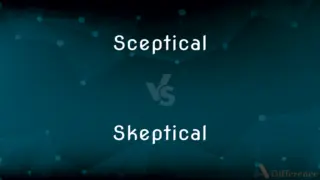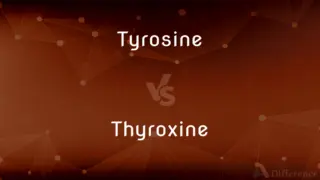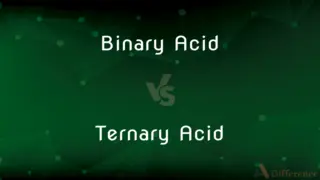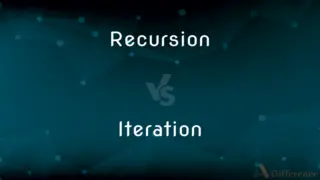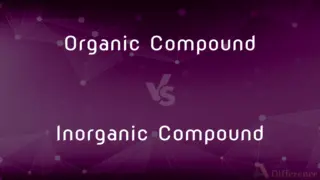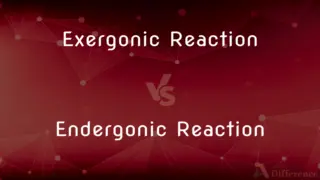Lucid vs. Vivid — What's the Difference?
By Tayyaba Rehman & Fiza Rafique — Updated on May 5, 2024
Lucid refers to clarity in thought or expression, while vivid describes intense and clear images or sensations.

Difference Between Lucid and Vivid
Table of Contents
ADVERTISEMENT
Key Differences
Lucid primarily refers to clearness of thought or style, used to describe a state where someone is able to think clearly or communicate effectively. Whereas, vivid is used to describe strong, clear, and powerful sensations or visual impressions that are almost lifelike in their intensity.
In writing or speech, lucidity conveys a clarity that makes understanding easier, highlighting straightforward and comprehensible expression. On the other hand, vivid language tends to evoke sensory experiences, painting pictures in the mind's eye or invoking other senses with detailed descriptions.
A lucid dream, for example, is one in which the dreamer is aware they are dreaming and can often control the events of the dream. Conversely, a vivid dream may not involve awareness or control but is characterized by highly realistic and detailed dream content.
Lucidity is often valued in contexts where understanding and clarity are crucial, such as in academic or technical explanations. Vividness, however, is more appreciated in creative and narrative writing, where the goal is to captivate and engage the audience with immersive descriptions.
In psychological terms, lucidity is associated with mental clarity, often used to describe moments when confusion clears up, allowing for sharp and effective reasoning. Vividness, however, is linked to the intensity of memories or experiences, where details are remembered with great clarity as if they happened yesterday.
ADVERTISEMENT
Comparison Chart
Definition
Clear and easily understood
Intensely deep or bright and detailed
Common in
Thinking, explanations, dreams
Descriptions, memories, dreams
Focus
Clarity and coherence
Intensity and detail
Desired in
Academic writing, clear communication
Creative writing, engaging narratives
Psychological association
Mental clarity, awareness
Memory intensity, sensory richness
Compare with Definitions
Lucid
Easily understood; clear.
She gave a lucid explanation of the complex process.
Vivid
(Of color) very bright and intense.
The artist's use of vivid blues and reds captured the sunset perfectly.
Lucid
Bright or luminous.
The full moon was lucid against the night sky.
Vivid
(Of a description) producing clear images in the mind.
Her vivid description of the city brought it to life for listeners.
Lucid
In a dream, aware that one is dreaming.
In her lucid dream, she could fly at will.
Vivid
Producing powerful feelings or strong, clear images in the mind.
He had a vivid imagination that filled his stories with extraordinary details.
Lucid
Mentally sound; sane or rational.
After the fever broke, he was finally lucid.
Vivid
Clear and detailed in memory.
He has vivid memories of his childhood in the countryside.
Lucid
Clear in thought or expression.
His lucid writing made difficult concepts easy to grasp.
Vivid
Appearing as real as reality.
The nightmare was so vivid that it woke her from her sleep.
Lucid
Expressed clearly; easy to understand
Write in a clear and lucid style
A lucid account
Vivid
Perceived as bright and distinct; brilliant
A vivid star.
Lucid
Bright or luminous
Birds dipped their wings in the lucid flow of air
Vivid
Having intensely bright colors
A vivid tapestry.
Lucid
Clearly expressed; easily understood
A lucid analysis of the problem.
Vivid
Having a very high degree of saturation
A vivid purple.
Lucid
Thinking or expressing oneself clearly, especially between periods of confusion; clearheaded
The feverish patient was lucid now and then.
Vivid
Presented in clear and striking manner
A vivid account of the incident.
Lucid
Brightly lit; luminous
"A lucid yellow moon was rising when Luke wheeled his truck to the curb and got out" (Willie Morris).
Vivid
Perceived or felt with the freshness of immediate experience
A vivid recollection of their childhood.
Lucid
Clear; transparent
A lucid stream.
Vivid
Active in forming lifelike images
A vivid imagination.
Lucid
Clear; easily understood
Vivid
(of perception) Clear, detailed or powerful.
Lucid
Mentally rational; sane
Vivid
(of an image) Bright, intense or colourful.
Lucid
Bright, luminous, translucent or transparent
Vivid
Full of life, strikingly alive.
Lucid
A lucid dream.
Vivid
(New Zealand) A felt-tipped permanent marker.
Lucid
Shining; bright; resplendent; as, the lucid orbs of heaven.
Lucid, like a glowworm.
A court compact of lucid marbles.
Vivid
True to the life; exhibiting the appearance of life or freshness; animated; spirited; bright; strong; intense; as, vivid colors.
In dazzling streaks the vivid lightnings play.
Arts which present, with all the vivid charms of painting, the human face and human form divine.
Lucid
Clear; transparent.
Vivid
Forming brilliant images, or painting in lively colors; lively; sprightly; as, a vivid imagination.
Body is a fit workhouse for sprightly, vivid faculties to exercise . . . themselves in.
Lucid
Presenting a clear view; easily understood; clear.
A lucid and interesting abstract of the debate.
Vivid
Evoking lifelike images within the mind;
Pictorial poetry and prose
Graphic accounts of battle
A lifelike portrait
A vivid description
Lucid
Bright with the radiance of intellect; not darkened or confused by delirium or madness; marked by the regular operations of reason; as, a lucid interval.
Vivid
Having the clarity and freshness of immediate experience;
A vivid recollection
Lucid
(of language) transparently clear; easily understandable;
Writes in a limpid style
Lucid directions
A luculent oration
Pellucid prose
A crystal clear explanation
A perspicuous argument
Vivid
Having striking color;
Bright greens
Brilliant tapestries
A bird with vivid plumage
Lucid
Having a clear mind;
A lucid moment in his madness
Vivid
(of color) having the highest saturation;
Vivid green
Intense blue
Lucid
Capable of thinking and expressing yourself in a clear and consistent manner;
A lucid thinker
She was more coherent than she had been just after the accident
Lucid
Transmitting light; able to be seen through with clarity;
The cold crystalline water of melted snow
Crystal clear skies
Could see the sand on the bottom of the limpid pool
Lucid air
A pellucid brook
Transparent cristal
Common Curiosities
Why is lucidity important in communication?
Lucidity is important because it ensures that the information is conveyed clearly and understood easily, reducing misunderstandings.
Can dreams be both lucid and vivid?
Yes, dreams can be both lucid (where you are aware you are dreaming) and vivid (detailed and intense).
What does lucid mean?
Lucid means clear and understandable, often used to describe clear thinking or clear expression.
Is lucidity the same as intelligence?
Not exactly. While intelligence involves the capacity to understand and learn, lucidity specifically refers to clarity in thought or expression at any given moment.
How can writers achieve vivid storytelling?
Writers can achieve vivid storytelling by using descriptive language that appeals to the senses, crafting detailed and colorful scenes that captivate readers.
What makes a vivid description effective?
A vivid description is effective because it engages the reader's senses and emotions, making the scene or experience more memorable.
Can vivid colors affect emotions?
Yes, vivid colors can strongly affect emotions, as bright and intense colors are often associated with more dynamic and stimulating feelings.
How is vivid used in a sentence?
Vivid is used to describe things that are intensely colored, highly detailed, or evoke strong mental images.
What role does lucidity play in learning?
Lucidity helps in learning by making information clear and easy to understand, thus facilitating better retention and application of knowledge.
How does one enhance lucidity in writing?
Enhancing lucidity in writing can be achieved by using straightforward language, organizing thoughts logically, and avoiding unnecessary jargon or complexity.
Share Your Discovery

Previous Comparison
Water vs. Lava
Next Comparison
Foe vs. FriendAuthor Spotlight
Written by
Tayyaba RehmanTayyaba Rehman is a distinguished writer, currently serving as a primary contributor to askdifference.com. As a researcher in semantics and etymology, Tayyaba's passion for the complexity of languages and their distinctions has found a perfect home on the platform. Tayyaba delves into the intricacies of language, distinguishing between commonly confused words and phrases, thereby providing clarity for readers worldwide.
Co-written by
Fiza RafiqueFiza Rafique is a skilled content writer at AskDifference.com, where she meticulously refines and enhances written pieces. Drawing from her vast editorial expertise, Fiza ensures clarity, accuracy, and precision in every article. Passionate about language, she continually seeks to elevate the quality of content for readers worldwide.







